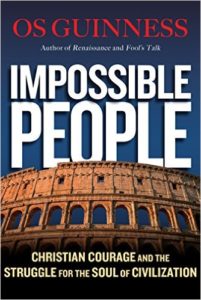 I’m working my way through a new book by Os Guinness called Impossible People: Christian Courage and the Struggle for the Soul of Civilization. It diagnoses the problem of the church as it becomes co-opted by modernity.
I’m working my way through a new book by Os Guinness called Impossible People: Christian Courage and the Struggle for the Soul of Civilization. It diagnoses the problem of the church as it becomes co-opted by modernity.
Guinness says, quite correctly, I believe, that it’s not the frontal attacks of secularism and atheism that do the real damage; rather, it is the seduction and distortion of the faith through modernity that leads us astray and destroys the Christian witness to civilization.
Guinness says that predictions of the disappearance of religion in our culture are off-target. In fact, religion is flourishing, but the nature of the Christian faith has been subtly altered, thereby making it less genuine.
One major change in perception that has changed the faith is the undermining of the whole concept of submission to authority. We have shifted “from a stance under authority to one of preference. . . . All responses are merely a matter of preference.” This is at odds with basic Christianity. “Unique among the gods believed in throughout history, the Lord is transcendent, so what he says is truth, binding truth, because it addresses us as authority. To dilute this authority is to dismiss the Lord himself,” Guinness notes.
The statement “Jesus is Lord” is the essence of Biblical truth. There is no other name through which anyone can be saved.
Our modern world, though, informs us that there is no ultimate authority; we have unlimited choice in life.
From breakfast cereals to restaurants and cuisines to sexual identities and temptations to possible sexual arrangements of all types to self-help techniques and philosophies of life, we are offered an infinite array of choices, and the focus is always on choice as choosing rather than choice as the content of what is chosen. Simply choose. Experiment. Try it out for yourself.
 Guinness goes on: “Our freedom is the freedom to choose, regardless of whether our choice is right or wrong, wise or stupid. . . . Choosing is all that matters. Truth, goodness, and authority are irrelevant.”
Guinness goes on: “Our freedom is the freedom to choose, regardless of whether our choice is right or wrong, wise or stupid. . . . Choosing is all that matters. Truth, goodness, and authority are irrelevant.”
In the world at large, this leads to the rejection of any absolute standard. Guinness explains,
Does it matter . . . whether your sister-in-law is straight or lesbian, or your boss is a heterosexual womanizer, a homosexual, or was once a woman? There are different strokes for different folks. We are all different, so who are we to judge? . . . This is my choice. That is yours. We are all free to choose differently, and our choices only amount to different preferences, so who is to say who is right? . . . And what business do any of us have to judge other people’s preferences?
It’s understandable that the world outside the Christian faith would fall for this, but when it shows up in the church, that’s when the faith is compromised and loses its witness of truth to the world.
As Guinness laments, “Christian advocates of homosexual and lesbian revisionism believe in themselves and in the sexual revolution rather than the gospel. They therefore twist the Scriptures to make reality fit their desires rather than making their desires fit the truths of the Scriptures.”
In our seeker-friendly church world, we often exchange the truth for a lie. Guinness quotes from a Christian marketing consultant who said, apparently without any sense of irony, “It is . . . critical that we keep in mind a fundamental principle of Christian communication: the audience, not the message, is sovereign.”
 Guinness expresses his shock over such a statement: “The audience is sovereign? No! Let it be repeated a thousand times, no! When reaching out as the church of Jesus, the message of the gospel and Jesus the Lord of the message is alone sovereign—and never, never, never the audience, however needy, however attractive, however prestigious or well-heeled an audience may be.”
Guinness expresses his shock over such a statement: “The audience is sovereign? No! Let it be repeated a thousand times, no! When reaching out as the church of Jesus, the message of the gospel and Jesus the Lord of the message is alone sovereign—and never, never, never the audience, however needy, however attractive, however prestigious or well-heeled an audience may be.”
While we are to be sensitive to those seeking the truth, we must have truth to offer them. While we are to be all things to all people, the purpose for that admonition is to bring them to the Truth Himself.
Here is the challenge, as Guinness so clearly lays it out:
All Evangelicals should search their hearts. For a generation now the air has been thick with talk of “changing the world,” but who is changing whom?
There is no question that the world would like to change the church. In area after area only the church stands between the world and its success over issues such as sexuality. Unquestionably the world would like to change the church, but does the church still want to change the world, or is its only concern to change the church in the light of the world?
Something is rotten in the state of Evangelicalism, and all too often it is impossible to tell who is changing whom.
I would add that as I survey the current political state of America and the evangelical rush to support, and even promote, a candidate whose worldview and lifestyle is contrary to the Gospel, that I see this rot infecting evangelicalism to its very core.
Who is changing whom?
I applaud Os Guinness’s clarion call that we be the church once more.
